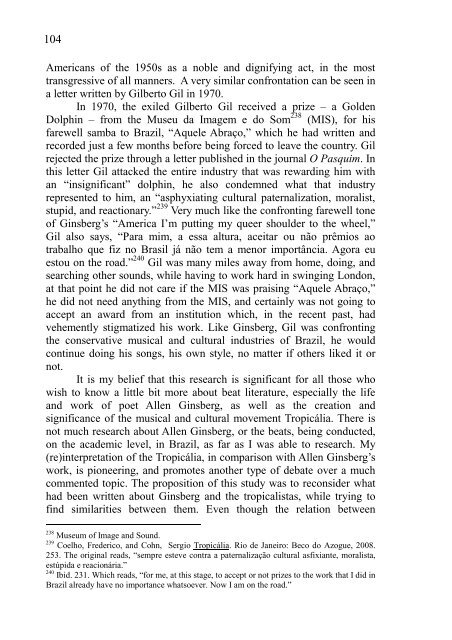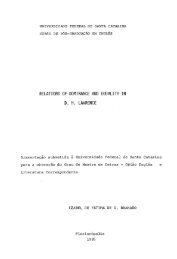Tropical ginsberg
Tropical ginsberg
Tropical ginsberg
Create successful ePaper yourself
Turn your PDF publications into a flip-book with our unique Google optimized e-Paper software.
104<br />
Americans of the 1950s as a noble and dignifying act, in the most<br />
transgressive of all manners. A very similar confrontation can be seen in<br />
a letter written by Gilberto Gil in 1970.<br />
In 1970, the exiled Gilberto Gil received a prize – a Golden<br />
Dolphin – from the Museu da Imagem e do Som 238 (MIS), for his<br />
farewell samba to Brazil, “Aquele Abraço,” which he had written and<br />
recorded just a few months before being forced to leave the country. Gil<br />
rejected the prize through a letter published in the journal O Pasquim. In<br />
this letter Gil attacked the entire industry that was rewarding him with<br />
an “insignificant” dolphin, he also condemned what that industry<br />
represented to him, an “asphyxiating cultural paternalization, moralist,<br />
stupid, and reactionary.” 239 Very much like the confronting farewell tone<br />
of Ginsberg’s “America I’m putting my queer shoulder to the wheel,”<br />
Gil also says, “Para mim, a essa altura, aceitar ou não prêmios ao<br />
trabalho que fiz no Brasil já não tem a menor importância. Agora eu<br />
estou on the road.” 240 Gil was many miles away from home, doing, and<br />
searching other sounds, while having to work hard in swinging London,<br />
at that point he did not care if the MIS was praising “Aquele Abraço,”<br />
he did not need anything from the MIS, and certainly was not going to<br />
accept an award from an institution which, in the recent past, had<br />
vehemently stigmatized his work. Like Ginsberg, Gil was confronting<br />
the conservative musical and cultural industries of Brazil, he would<br />
continue doing his songs, his own style, no matter if others liked it or<br />
not.<br />
It is my belief that this research is significant for all those who<br />
wish to know a little bit more about beat literature, especially the life<br />
and work of poet Allen Ginsberg, as well as the creation and<br />
significance of the musical and cultural movement Tropicália. There is<br />
not much research about Allen Ginsberg, or the beats, being conducted,<br />
on the academic level, in Brazil, as far as I was able to research. My<br />
(re)interpretation of the Tropicália, in comparison with Allen Ginsberg’s<br />
work, is pioneering, and promotes another type of debate over a much<br />
commented topic. The proposition of this study was to reconsider what<br />
had been written about Ginsberg and the tropicalistas, while trying to<br />
find similarities between them. Even though the relation between<br />
238 Museum of Image and Sound.<br />
239 Coelho, Frederico, and Cohn, Sergio Tropicália. Rio de Janeiro: Beco do Azogue, 2008.<br />
253. The original reads, “sempre esteve contra a paternalização cultural asfixiante, moralista,<br />
estúpida e reacionária.”<br />
240 Ibid. 231. Which reads, “for me, at this stage, to accept or not prizes to the work that I did in<br />
Brazil already have no importance whatsoever. Now I am on the road.”

















